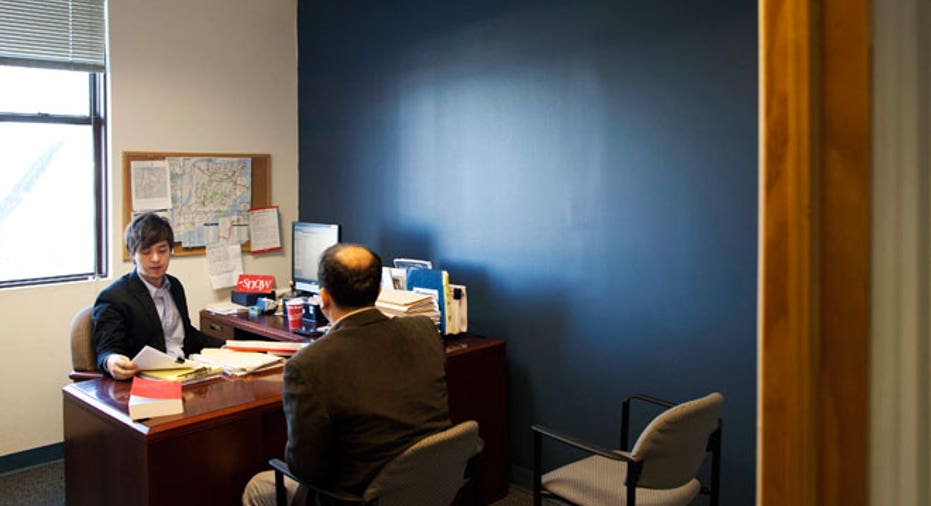How Confidence Affects Employment and the Job Hunt

When it comes to getting a job, confidence is key but it’s hard to remain self assured in a persistently weak labor market.
“In a really great economy, you can send 20 resumes out on a job board and get maybe five responses, but now you can send out 100 resumes and get zero responses,” says Ellyn Enisman, author of Job Interview Skills 101 and founder of CollegeToCareerCoaching. “That’s very discouraging and when you get discouraged, it affects your output as well.”
According to human resources consultancy company WorkplaceDynamics’ latest Employee Confidence Index, confidence levels hit a high in December 2011, but then dropped quickly in the first few months of 2012 and stayed at or below those levels for the remainder of the year.
The index is based on more than a million survey responses to measure employee confidence levels by responses to this statement: I am confident about my future at this company. Most respondents cited concerns focusing on pay levels, growth and career projections, says Aman Grewal, managing partner at WorkplaceDynamics.
“Employees are expressing concern over uncertainty--decisions over the health-care reforms, government spending and the deficit are going to have a big impact on some sectors, and employees want clarity,” he says.
With a challenging job market, recent graduates may also find that lacking confidence will hinder their search efforts and can keep them from getting hired, says Enisman.
Low confidence levels can deter grads from effectively networking, says Douglas Brown, academic program manager for the MBA program offered by The Malcolm Baldrige School of Business at Post University.
“So much of job hunting is leveraging people and relationships,” he says. “If you are not confident in yourself, then you can’t expect people who you know to open up their network to you.”
To stay focused on getting hired, here are four ways grads can increase their confidence levels while on the job hunt.
Confidence Booster No.1: Quantify Past Experience
It’s essential that grads wade through job postings and identify what specific skills and personal characteristics are required for an open position and find posts that fit with their skill set, says Enisman.
“They really need to go over their own experiences and how they fit with those key words that they circled,” she says. “Once they do that, they’ll put pieces of the puzzle together that ‘I really am good for this job’ and they have that to prove it--that is the biggest confidence booster and it works.”
Creating a portfolio of past accomplishments and coursework will help grads visualize how they would be able to quantify those experiences in an interview, adds Brown.
“Look at the courses you took and write down a few bullets on each one, highlight what you learned, the projects you worked on and what it meant to you, do the same for all of your other activities,” he says. ‘You’ll see that you’ve done quite a lot and you’ll have good ideas for stories and anecdotes to use in your interview preparation.”
Confidence Booster No.2: Hone Interviewing Skills
Researching common interview questions, making notes and practicing answers out loud can increase grads’ comfort levels for when they get to the formal interview process.
“Take the company profile you prepared and give it to the [practice] interviewer with a list of questions you might get – including the ones you don’t want to answer,” Brown says. “Don’t forget to give your interviewer a copy of the job description and an evaluation sheet to grade your performance.”
Grads can practice with a friend or family member, but should seek out a career coach that specializes in coaching recent grads if they feel they need more professional guidance, advises Enisman.
“Interviewing as a new grad is very different than interviewing as an experienced person…and working with a coach that specializes in college grads can help them because they understand how that part of the classroom translates to the board room.”
Confidence Booster No.3: Continue to Enhance Your Resume
Although job searching is a full-time position in itself, it’s important that grads stay occupied and active in their field through volunteer work, internships and freelance projects to continue to build experience, says Dan Schawbel, career expert and author of Promote Yourself.
“Employers would rather hire someone who is already doing something rather than someone who’s just searching--they want someone who is actively engaging in work,” he says.
“You can build confidence because you’re doing something you enjoy, it’s something you’re good at so you can get results that way while you beef up your resume in the process of job searching.”
Confidence Booster No.4: Seek Peer Support
Fellow job seekers should create a support group to give each other perspective and advice on their progress and to help pinpoint and fix any tactics not working, says Brown.
“Surround yourself with people who will be supportive but also tell you what you need to hear when you don’t want to hear it--those are the people who will help you stay on track,” he says.
Grads already gainfully employed can shed some light on their own experience and may be able to provide an internal referral, says Schawbel.
“Instead of going blind, understanding the company you want to work for and exactly how to get in based on someone who already got in is just learning from experience that could help you make the right move.”



















